 On the Origin
of Species:
On the Origin
of Species:
or the Preservation of Favoured
Races in the Struggle for Life.
Charles Robert Darwin
1859
Contents,
evidence, conclusion,
meaning
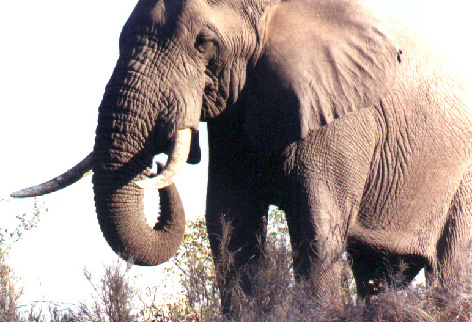
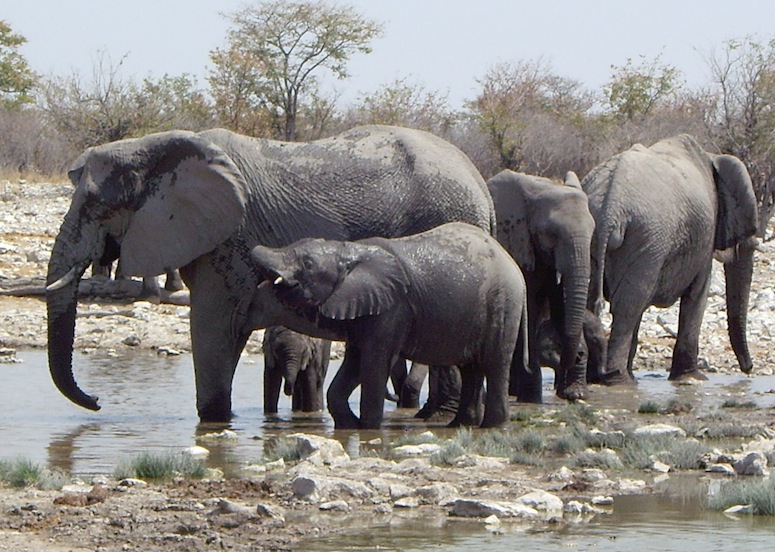
An
African elephant in her home range, Krueger National Park, S.A., [J.
Siry. 2002] and a yearling in the Etosha Pan of the Namibian desert. [J.
Siry. 2013].


"When
we no longer look at an organic being as a savage looks at a ship, as something
wholly beyond his comprehension; when we regard every production of nature
as one which has had a history; when we contemplate every complex structure
as and instinct as the summing up of many contrivances, each useful to the
possessor, nearly in the same way as when we look at any great mechanical
invention as the summing of labor, the experience, the reason and even the
blunders of numerous workmen; when we thus view each organic being, how far
more interesting,...will the study of natural history become."
(pp. 485-86.)
INTRODUCTION.

When on board H.M.S.
'Beagle,' as a naturalist, I was much struck with
certain facts in the distribution of the inhabitants of South America, and
in the geological relations of the present to the past inhabitants of that
continent. These facts seem to me to throw some light on the origin of species
-- that mystery of mysteries, as it has been called by one of our greatest
philosophers."
(1)
1
Variation under Domestication

"When we look to the individuals of the same variety
or sub-variety of our older cultivated plants and animals, one of the first
points which strikes us, is, that they generally differ much more from each
other than do the individuals of any one species or variety in the state
of nature."
"It seems pretty clear that organic beings must be exposed
during several generations to the new conditions of life to cause any appreciable
amount of variation; and that when the organism has once begun to vary,
it generally continues to vary for many generations."
page 7.

2
Variation under Nature

"I look at the term species, as one arbitrarily given
for the sake of convenience to a set of individuals closely resembling each
other, and that it does not essentially differ from the term variety, which
is given to less distinct and more fluctuating forms."
(52)
"Finally, then, varieties have the same general characteristics
of species, for they can not be distinguished from species,-- except, firstly,
by the discovery of intermediate linking forms, and the occurrence of such
links cannot affect the actual characters of the forms which they connect;...but
the amount of difference considered necessary to give to two forms the rank
of species is quite indefinite."
(58-59)
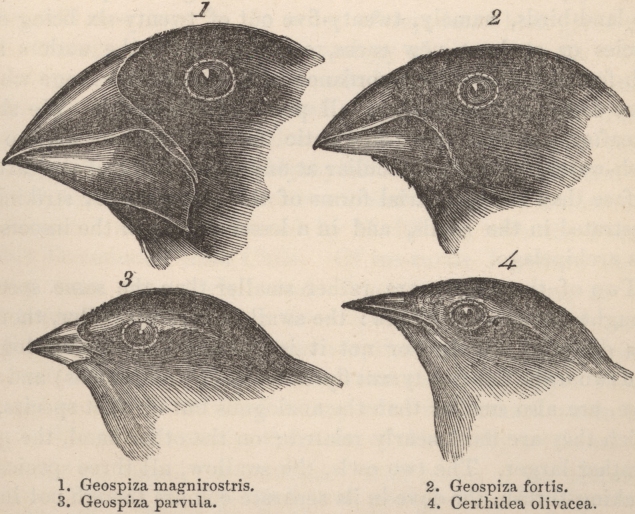
"we can clearly understand these analogies [varieties
to species], if species have once existed as varieties, and have thus originated:
whereas, these analogies are utterly inexplicable if each species has been
independently created."
(59)
"And thus, the forms of life throughout the universe
become divided into groups subordinate to groups."
return
to Table of Contents
3
Struggle for Existence




"I have called this principle, by which each slight variation,
if useful, is preserved, by the term Natural Selection, in order to mark its
relation to man"s power of selection."
"But natural selection, as we shall see, is a power incessantly
ready for action, and is immeasurably superior to man"s feeble efforts,..."
(61)
"all organic beings are exposed to severe competition."
(62)
"I use the term Struggle for Existence in the large and
metaphorical sense, including the dependence of one being on another, and
including not only the life of the individual, but success in leaving progeny."
(62)
"A struggle for existence inevitably follows from the
high rate at which all organic beings tend to increase."
(63)
"There is no exception to the rule that every organic
being naturally increases at so high a rate, that if not destroyed, the earth
would soon be covered by the progeny of a single pair."
(64)
I am tempted to give one more instance showing how plants and animals, most remote in the scale of nature, are bound together by a web of complex relations. I shall hereafter have occasion to show that the exotic Lobelia fulgens, in this part of England, is never visited by insects, and consequently, from its peculiar structure, never can set a seed. Many of our orchidaceous plants absolutely require the visits of moths to remove their pollen-masses and thus to fertilise them. I have, also, reason to believe that humble-bees are indispensable to the fertilisation of the heartsease (Viola tricolor), for other bees do not visit this flower. From experiments which I have tried, I have found that the visits of bees, if not indispensable, are at least highly beneficial to the fertilisation of our clovers; but humble-bees alone visit the common red clover (Trifolium pratense), as other bees cannot reach the nectar. Hence I have very little doubt, that if the whole genus of humble-bees became
[page] 74, MUTUAL CHECKS TO INCREASE. CHAP. III.
extinct or very rare in England, the heartsease and red clover would become very rare, or wholly disappear. The number of humble-bees in any district depends in a great degree on the number of field-mice, which destroy their combs and nests; and Mr. H. Newman, who has long attended to the habits of humble-bees, believes that "more than two thirds of them are thus destroyed all over England." Now the number of mice is largely dependent, as every one knows, on the number of cats; and Mr. Newman says, "Near villages and small towns I have found the nests of humble-bees more numerous than elsewhere, which I attribute to the number of cats that destroy the mice." Hence it is quite credible that the presence of a feline animal in large numbers in a district might determine, through the intervention first of mice and then of bees, the frequency of certain flowers in that district!
pp. 73-74.
"Even slow-breeding man has doubled in twenty-five years,
and at this rate, in a few thousand years, there would literally not be standing
room for his progeny."
"It will convince us of our ignorance on the mutual relations
of all organic beings; a conviction as necessary, as it seems to be difficult
to acquire."
(78)
All that we can do, is to keep steadily in mind that each
organic being is striving to increase at a geometrical ratio; that each at
some period of its life, during some season of the year, during each generation
or at intervals, has to struggle for life and to suffer great destruction."
(79)
When we reflect on this struggle, we may console ourselves
with the full belief, that war of nature is not incessant, that no fear is
felt, that death is generally prompt, and that the vigorous, the healthy,
and the happy survive and multiply."
(79)
return
to Table of Contents
4
Natural Selection

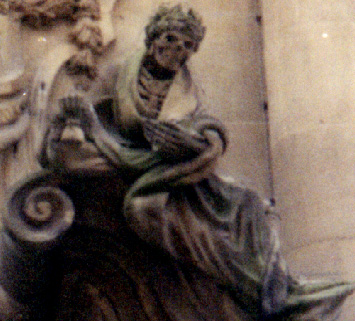
"Let it be borne in mind how infinitely complex and close
fitting are the mutual relations of all organic beings to each other and to
the physical conditions of life."
(80)
"This preservation of favorable variations and the rejection
of injurious variations, I call Natural Selection."
(81)
"We shall best understand the probable course of
natural selection by taking the case of a country undergoing some physical
change, for instance, of climate."
(81)
"In such a case, every slight modification, which in
the course of the ages chanced to arise, and which in any way favored the
individuals of any species, by better adapting them to their altered conditions,
would tend to be preserved; an natural selection would thus have free scope
for the work of improvement."
(82)
"nature cares nothing for appearances,
except in so far as they may be useful to any being. She can act on every
internal organ, on every shade of constitutional difference, on the whole
machinery of life."
(83)
"Under nature, the slightest difference of structure
or constitution may well turn the nicely-balanced scale in the struggle
for life, and so be preserved."
(83-84)
"It may be said that natural selection is daily and hourly
scrutinizing, throughout the world, every variation, even the slightest,...
silently and incessantly working, whenever and wherever opportunity offers,
at the improvement of each organic being relation to its organic and inorganic
conditions of life."
(84)
"This principle of preservation,
I have called, for the sake of brevity, Natural Selection.
Natural selection, on the principle of qualities being inherited at corresponding
ages, can modify the egg, seed, or young, as easily as the adult."
(127)
Natural selection, also, leads to divergence of character;
for more living beings can be supported on the same
area the more they diverge in structure, habits and constitution, of
which see proof by looking at the inhabitants of any small spot or at naturalized
productions."
(127-28)
"Therefore..., the more diversified these descendants
become, the better will be their chance of succeeding in the battle for life."
(128)
"The affinities of all the beings of the same class have
sometimes been represented by a giant tree."
(129)
"As buds give rise by growth by growth to fresh buds,
and these, if vigorous, branch out and overtop on all sides many a feebler
branch, so by generation I believe it has been with the great Tree of Life,
which fills with its dead and broken branches the crust of the earth, and
covers the surface with its ever branching and beautiful ramifications."
(130)
return
to Table of Contents
5
Laws of Variation

"Nevertheless, we can here and there dimly catch a faint
ray of light, and we may feel sure that there must be some cause for each
deviation of structure, however slight."
(132)
How much direct effect difference of climate, food, &
c., produces on any being is extremely doubtful."
"complex co-adaptations of structure between one organic
being and another, which we see everywhere throughout nature."
(132)
"When a variation is of the slightest use to a being,
we cannot tell how much of it to attribute to the accumulative action of natural
selection, and how much to the conditions of life."
(133)
the effects of use & disuse
(134)
Acclimatization -" Habit is hereditary with plants, as
in the period of flowering, in the amount of rain requisite for seeds to germinate,
in the time of sleep,..."
(139)
"as Goethe expressed it, "in order to spend on one
side, nature is forced to economize on the other side." I think this
holds true to a certain extent with our domestic productions..."
(147)
"A part developed in any species in an extraordinary
degree or manner, in comparison with the same part in allied species, tends
to be highly variable."
["with respect to the length of the arms of the ourang-outang"]
(150)
"Distinct species present analogous variations;
and a variety of one species often assumes some of the characters of an allied
species, or reverts to some of the characters of an allied species, or reverts
to some of the characters of an early progenitor."
(159)
"Habit in producing constitutional differences, and use
in strengthening, and disuse in weakening and diminishing organs, seem to
have been more potent in their effects."
(167-68)
"Although new and important modifications may not arise
from reversion and analogous variation, such modifications will add to the
beautiful and harmonious diversity of nature."
(169)
"Whatever the cause may be of each slight difference
in the offspring from their parents -- and a cause for each must exist --
it is the steady accumulation; through natural selection, of such differences,
when beneficial to the individual, that gives rise to all the more important
modifications of structure, by which the innumerable beings on the face of
this earth are enabled to struggle with each other, and the best adapted to
survive."
(170)
return
to Table of Contents
6 Difficulties
on Theory

"LONG before having arrived at
this part of my work, a crowd of difficulties will have occurred to the reader.
Some of them are so grave that to this day, I can never reflect on them without
being staggered; but to the best of my judgment, the greater number are only
apparent, and those that are real are not ...fatal to my theory."
171
"Firstly, why,...do we not everywhere see innumerable
transition forms." [of species, or "missing links"]
"Secondly, is it possible that an animal having, for
instance the structure and habits of a bat, could have been formed by the
modification of some animal with wholly different habits?"
"Thirdly, can instincts be acquired and modified through
natural selection?"
172
"Fourthly, how can we account for species when crossed,
being sterile...?
"To suppose that the eye, with all its inimitable contrivances
for adjusting the focus to different distances, for admitting different amounts
of light, and for the correction of spherical and chromatic aberrations, could
have been formed by natural selection, seems, I freely confess, absurd in
the highest possible degree."
186
"but, I may remark that several facts make me suspect
that any sensitive nerve may be rendered sensitive to light, and likewise
to those coarser vibrations of the air which produce sound."
187
"I can indeed hardly doubt that all vertebrate animals
having true lungs have descended by ordinary generation from an ancient prototype,
of which we know nothing, furnished with a floating apparatus or swim bladder."
191
"It is generally acknowledged that all organic
being have been formed on two great laws--Unity of Type
and the Conditions of Existence."
"On my theory, Unity of type is explained
by unity of descent. The expression of the conditions of existence,...is fully
embraced by the principle of natural selection."
"Hence, in fact, the Law of the Conditions
of existence is the higher law; as it includes through the inheritance of
former adaptations, that Unity of Type."
206
return
to Table of Contents
7 Instinct

" it is said that instinct impels the cuckoo to migrate
and lay her eggs in the other birds' ( species ) nests."
Instinct
"An action" "when performed by an animal,
more especially by a very young one, without any experience, and when performed
by many individuals in the same way, without their knowing for what purpose
it is performed, is usually said to be instinctive."
207
readily performed, yet unconscious actions displayed by large
numbers of similar animals
"none of these characters of instinct is universal."
208
caterpillar"s hammock and its seven stages of producing
the cocoon
"It can clearly be shown that the most wonderful instincts
with which we are acquainted, namely, those of the hive-bee and of many ants,
could not possibly have been thus acquired."
209
"instincts are as important as corporeal structure
for the welfare of each species."
"As modifications of corporeal structure arise from,
and are increased by, use or habit, and are diminished by loss or disuse,
so I do not doubt it has been with instincts."
"No complex instinct can possibly be produced through
natural selection, except by the slow and gradual accumulation of numerous,
slight, yet profitable, variations."
210
"The canon of 'Natura non facit
saltum.' applies with almost equal force to instincts as to bodily
organs".
instinct functions to "adapt the creature more accurately
with the vicissitudes of life."
Experimental
evidence

Darwin's Curly dock, aphids and the ants as instinctually
altruistic behavior (cows & humans) --
"it then began to play with its antennae on the abdomen
first f one aphis and then another; and each aphis, as soon as it felt (smelt)
the antennae, immediately lifted up it abdomen and excreted a limpid drop
of sweet juice, which was eagerly devoured by the ants."
211
"instincts certainly do vary -- for instance, the migratory
instinct"
So it is with the nests of birds "Audubon has given several
remarkable cases of differences in nests of the same species in the northern
and southern United States."
212
fear of man is slowly acquired" "the magpie so wary
in England, is tame in Norway, as is the hooded crow in Egypt."
breeds of dogs
213
"These domestic instincts, which are in a like manner
become curiously blended together, and for a long period exhibit traces of
the instincts of either parent."
214
"Natural instincts are lost under domestication."
215
Three cases: the cuckoo nest parasitism, slave
maker insects, & comb making hive bees
216
cuckoos and nesting
217
parasitic bees & wasps
218
slave making insects
219
witnessed a "migration from one nest to another,
and it was a most interesting spectacle to behold the masters carefully carrying,
"their slaves in their jaws."
221
reconnoiters after ant nests
222
sterile worker ants
ant raiding another species nest for "pupa"
223
Cell-making instinct of the bee-hive
224
"Let us look to the great principle of gradation, and
see whether Nature does not reveal to us her method of work."
225
"It is obvious that the Melipona save wax by this manner
of building; for the flat wall between the adjoining cells are not double,
but are of the same thickness as the outer spherical portions, and yet each
flat portion forms a part of two cells."
226
"I believe the hive -bee has acquired , through
natural selection, her inimitable architectural powers.
227-28
"It seems at first to add to the difficulty of understanding
how the cells (wax comb) are made, that a multitude of bees all work together
;"
231
"it is known that bees are hard pressed to get sufficient
nectar; and I am informed "that it has been experimentally found that
no less than from 12-15 pounds of dry sugar are consumed by a hive of bees
for the secretion of each pound of wax.... Hence the saving of wax by largely
saving honey must be a most important element of success in any family of
bees....altogether independent of the quantity of honey that the bees could
collect."
233-234
"The motive power of the process of natural selection
having been the economy of wax."
235
"they have been acquired by independent acts of natural
selection."
the neuters of sterile females in insect communities.."
236
"the difficulty lies in understanding how such correlated
modifications of structure could have been slowly accumulated by natural selection."
237
"The sterile condition of certain members of the community,
has been advantageous to the community:"
neuter ant castes
and "aphids, or the domestic cattle as they may be called,
which our European ants guard or imprison."
239
different castes of neuters in the same species
240
" As ants work by inherited instincts and by inherited
tools or weapons, and not by acquired knowledge and manufactured instruments,
a perfect division of labor could be affected with them only by the workers
being sterile; for had they been fertile, they would have intercrossed, and
their instincts and structure would have been blended."
242
"the power of natural selection ....The case...proves
that with animals, as with plants, any amount of modification in structure
can be effected by the accumulation of numerous, slight and we must
call them accidental, variations which are in any manner profitable, without
exercise or habit having come into play."
"I have endeavored"to show that the mental qualities
of our domestic animals vary, and that the variations are inherited."
242
"instincts vary slightly in the state of nature."
243
"natura non facit saltum"
"instincts" corroborate the theory of natural selection"
British & the S. American thrushes line their nest with
mud!
North American & British wrens isolation , yet same type
of odd nest
"a habit wholly unlike that of any other known bird."
243
In summary he looked at such instincts as:
young cuckoo dumping out rival eggs from the nest
ants making slaves,
the larvae of ichumonidae feeding within the live bodies of caterpillars
"not as specially endowed or created instincts, but as
small consequences of one general law, leading to the advancement of all organic
beings, namely multiply, vary, let the strongest live and the weakest die."
244
return
to Table of Contents
8 Hybridism

The view generally entertained by naturalists is that species,
when intercrossed, have been specially endowed with the quality of sterility,
in order to prevent the confusion of all organic forms."
The importance of the sterility in hybrids
245
return
to Table of Contents
9 On the Imperfections
in the Geological record

"I have endeavored to show, that the life of each species
depends in a more 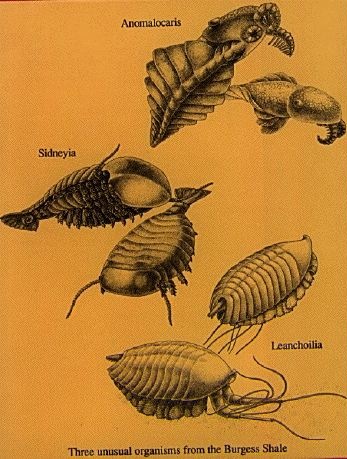 important manner on the presence of other already defined
organic forms, than on climate; and, therefore, that the really governing
conditions of life do not graduate away quite insensibly like heat or moisture."
important manner on the presence of other already defined
organic forms, than on climate; and, therefore, that the really governing
conditions of life do not graduate away quite insensibly like heat or moisture."
279
10 The Geological
succession of Organic Beings
"I believe in no fixed law of development, causing all
the inhabitants of a country to change abruptly, or simultaneously, or to
an equal degree. The process of modification must be extremely slow."
314
return
to Table of Contents
11 Geographical distribution
(cannot be accounted for by differences
in physical conditions)

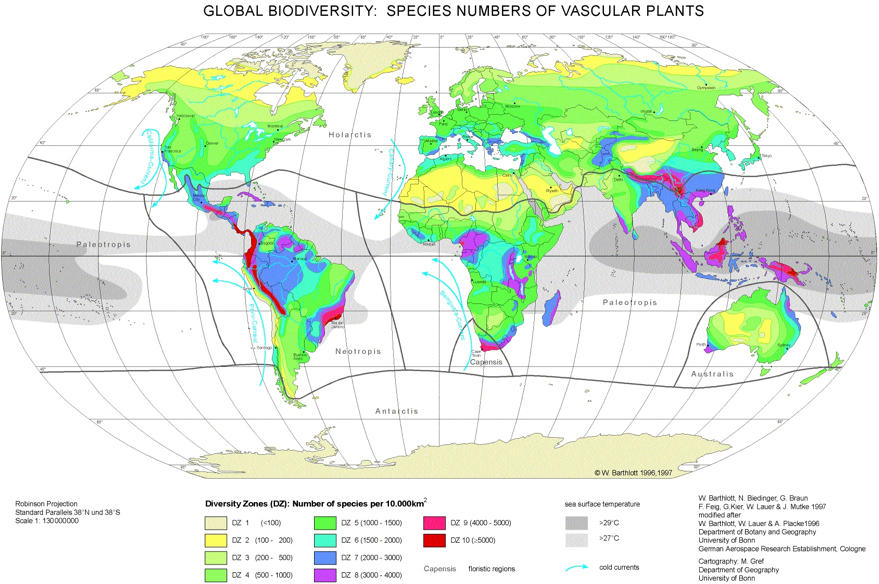 "Notwithstanding this parallelism (of climates and features
in the continents) in
the conditions of the Old and New Worlds, how widely different are their living
productions!"
"Notwithstanding this parallelism (of climates and features
in the continents) in
the conditions of the Old and New Worlds, how widely different are their living
productions!"
"In the southern hemisphere, if we compare large tracts
of land in Australia, South Africa, and western South America,...we shall
find parts extremely similar in all their conditions, yet it would not be
possible to point out three faunas and floras more utterly dissimilar."
347
12 Geographical distribution
(dispersal of freshwater forms)

"As exemplifying the effects of climatic changes on distribution,
I have attempted to show how important has been the influence of the modern
Glacial period, which I am fully convince simultaneously affected the whole
world, or at least great meridional belts."
"remember that some forms of life change most slowly,
enormous periods of time being thus granted for their migration, I do not
think that the difficulties are insuperable."
407
return
to Table of Contents
13 Mutual Affinities
of Organic Beings, or Embryology

"I have attempted to show, that the subordination of
group to group in all organisms throughout all time; that the nature of the
relationship, by which all living and extinct beings are united by complex,
radiating, and circuitous lines of affinities into one grand system,....all
naturally follow on the view of common parentage of those forms which are
considered by naturalists as allied, together with their modification through
natural selection, with its contingencies of extinction and divergence of
character"
p. 456.
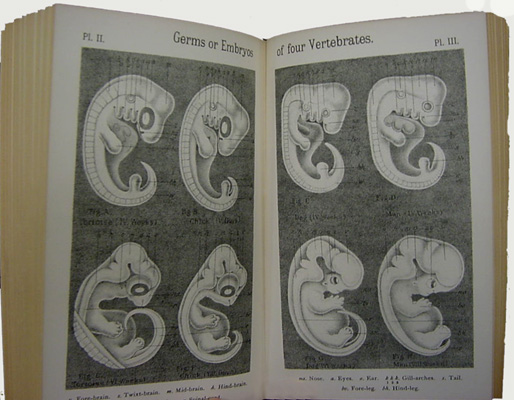
Ernst Haeckel's page on comparative embryos, a proponent of Darwin from Germany.
return
to Table of Contents
14 Recapitulation
and Conclusion

"As this whole volume is one long argument, it may be
convenient to the reader to have the leading facts and inferences briefly
recapitulated." restated
"the following propositions – that gradations in the perfection
of any organ or instinct, which we may consider. . . – that all organs and instincts
are, in ever so slight a degree, variable,– and lastly,
that there is a struggle for existence leading to the preservation of each
profitable deviation of structure or instinct."
459
"All the individuals of the same species,
and all the species of the same genus, or even higher group [family,
order, etc.], must have descended from common parents; and therefore,
in however distant and isolated parts of the world they are now found, they
must in the course of successive generations have passed from some one part
to the others."
461
return
to Table of Contents
The Origin of Species: or the Preservation
of Favoured races in the Struggle for Life. by Charles
Darwin, 1859.
Chapter
2 | Chapter 3 | Chapter 4 | Chapter
5 | Chapter 6 | Chapter 7 | Chapter
8 | Chapter 9 | Chapter 10 | Chapter 14
Conclusion
"It is interesting to contemplate
an entangled bank, clothed with many plants of many kinds, with birds
singing on the bushes, with various insects flitting about, and with worms
crawling through the damp earth, and to reflect that these elaborately constructed
forms, so different from each other, and dependent on each other in so complex
a manner, have all been produced by laws acting around us.
These laws, taken in the largest sense, being Growth with
Reproduction; Inheritance which is almost implied by reproduction; Variability
from the indirect and direct action of the external conditions of life, and
from use and disuse; a Ration of Increase so high as to lead to a Struggle
for Life, and as a consequence to Natural Selection, entailing divergence
of character and the extinction of less-improved forms.
Thus from the war of nature, from famine and death, the most
exalted object which we are capable of conceiving, namely, the production
of the higher animals, directly follows."
"There is a grandeur in
this view of life, with its several powers, having been originally breathed
into a few forms or into one; and that, whilst this planet has gone cycling
on according to the fixed law of gravity, from so simple a beginning endless
forms most beautiful and most wonderful have been, and are being, evolved."
![]()

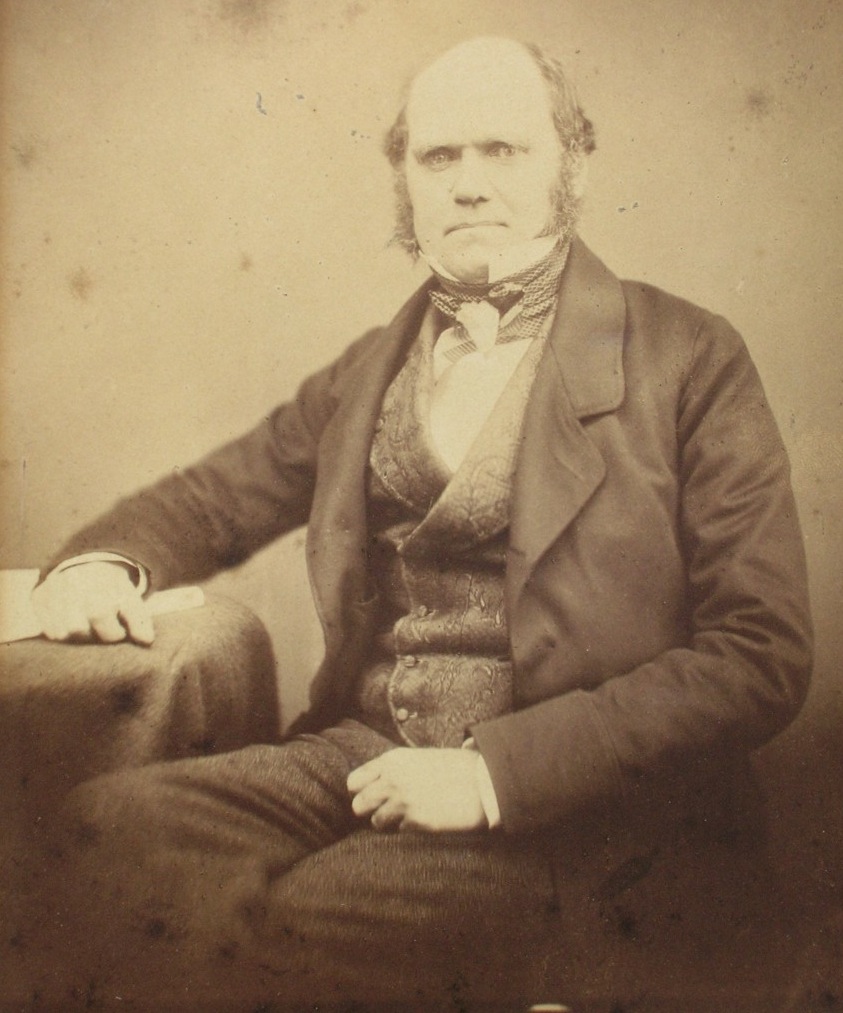

![]()
![]()
![]()
![]()



![]()

![]()
![]()






 important manner on the presence of other already defined
organic forms, than on climate; and, therefore, that the really governing
conditions of life do not graduate away quite insensibly like heat or moisture."
important manner on the presence of other already defined
organic forms, than on climate; and, therefore, that the really governing
conditions of life do not graduate away quite insensibly like heat or moisture."  "Notwithstanding this parallelism (of climates and features
in the continents) in
the conditions of the Old and New Worlds, how widely different are their living
productions!"
"Notwithstanding this parallelism (of climates and features
in the continents) in
the conditions of the Old and New Worlds, how widely different are their living
productions!"
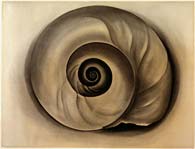 "Conditions of Existence is the
higher law;"
"Conditions of Existence is the
higher law;"